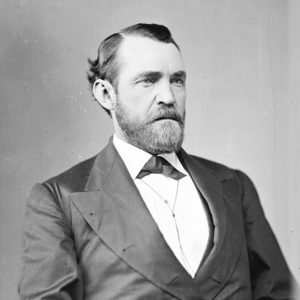calsfoundation@cals.org
William Wallace Wilshire (1830–1888)
William Wallace Wilshire was a Republican member of the U.S. House of Representatives. He represented the Third District of Arkansas in the Forty-Third and Forty-Fourth Congresses, serving from 1873 to 1874 and from 1875 to 1877.
W. W. Wilshire was born on September 8, 1830, in Shawneetown, Illinois, to William Wilshire and Mary Akers Wilcher (the spelling of the name seems to have varied over the generations). He was educated in the local schools before heading to California in 1852 to prospect for gold. He returned to Illinois in 1855, pursing coal mining and mercantile endeavors in Port Byron while also studying law. His was admitted to the state bar in 1859, but his legal career was interrupted by the Civil War. Wilshire joined the Union army as a major in the 126th Regiment of the Illinois Volunteer Infantry. He served from July 1862 until July 1864 before he resigned from the army due to ill health.
At the end of the war, Wilshire moved to Little Rock (Pulaski County) and began to practice law. He was appointed state solicitor general in 1867. He then served as chief justice of the Arkansas Supreme Court from 1868 until 1871 before returning to private legal practice. He then sought election to the U.S. House of Representatives, running as a Liberal Republican.
Reconstruction in Arkansas brought clashes on many levels, both social and political, and hard-fought elections; charges of stolen votes and voter fraud were not uncommon. The election for the Third District House seat in 1872 was no exception. Wilshire was initially declared the winner, reportedly besting Democrat Thomas Gunter by a narrow margin. In March 1873, he assumed his responsibilities as the Representative of the Third District, but, in June 1874, he was replaced by Gunter, who had challenged the November 1872 result and was subsequently declared the rightful occupant of the seat. While his own contested election reflected the political turmoil that characterized Arkansas during Reconstruction, he did help bring a resolution to a far more infamous and inflammatory episode, using his influence with President Ulysses S. Grant and his administration to secure federal intervention in the Brooks–Baxter War of 1874.
After giving up his seat, Wilshire returned to Arkansas. After surveying the political landscape, Wilshire turned his back on his former partisan allegiances and determined to run again in 1874, this time as a Democrat. He defeated one-term congressman William J. Hynes—whose own victory in 1872 had also come amidst charges of corruption and irregularities—to again represent the Third District, as redistricting had moved his former rival, Thomas Gunter, to the Fourth. Wilshire served only the single additional term and did not pursue nomination in 1876.
Wilshire remained in Washington DC, where he practiced law. He was particularly active on behalf of the Cherokee tribes, representing them in their efforts to pursue claims against the government for land that had been previously taken. Indeed, his death on August 19, 1888, was a major blow to the efforts Wilshire had led on behalf of the “Old Settlers.”
Wilshire’s body was returned to Arkansas, and he is interred in Mount Holly Cemetery in Little Rock. His wife, Catherine A. Reynolds Wilshire—with whom he had two daughters, Margaret and Mary Ellen—died in 1900 and is also interred in Mount Holly Cemetery.
For additional information:
“The Contested Arkansas Seats.” Morning Republican (Little Rock, Arkansas), February 11, 1874, p. 4.
“Death of W. W. Wilshire, Attorney for the Old Settlers.” Cherokee Advocate (Tahlequah, Oklahoma), August 29, 1888, p. 1.
“William Wallace Wilshire.” Biographical Directory of the United States Congress. http://bioguide.congress.gov/scripts/biodisplay.pl?index=W000567 (accessed September 29, 2021).
William H. Pruden III
Ravenscroft School
 Post-Reconstruction through the Gilded Age, 1875 through 1900
Post-Reconstruction through the Gilded Age, 1875 through 1900 William W. Wilshire
William W. Wilshire 




Comments
No comments on this entry yet.